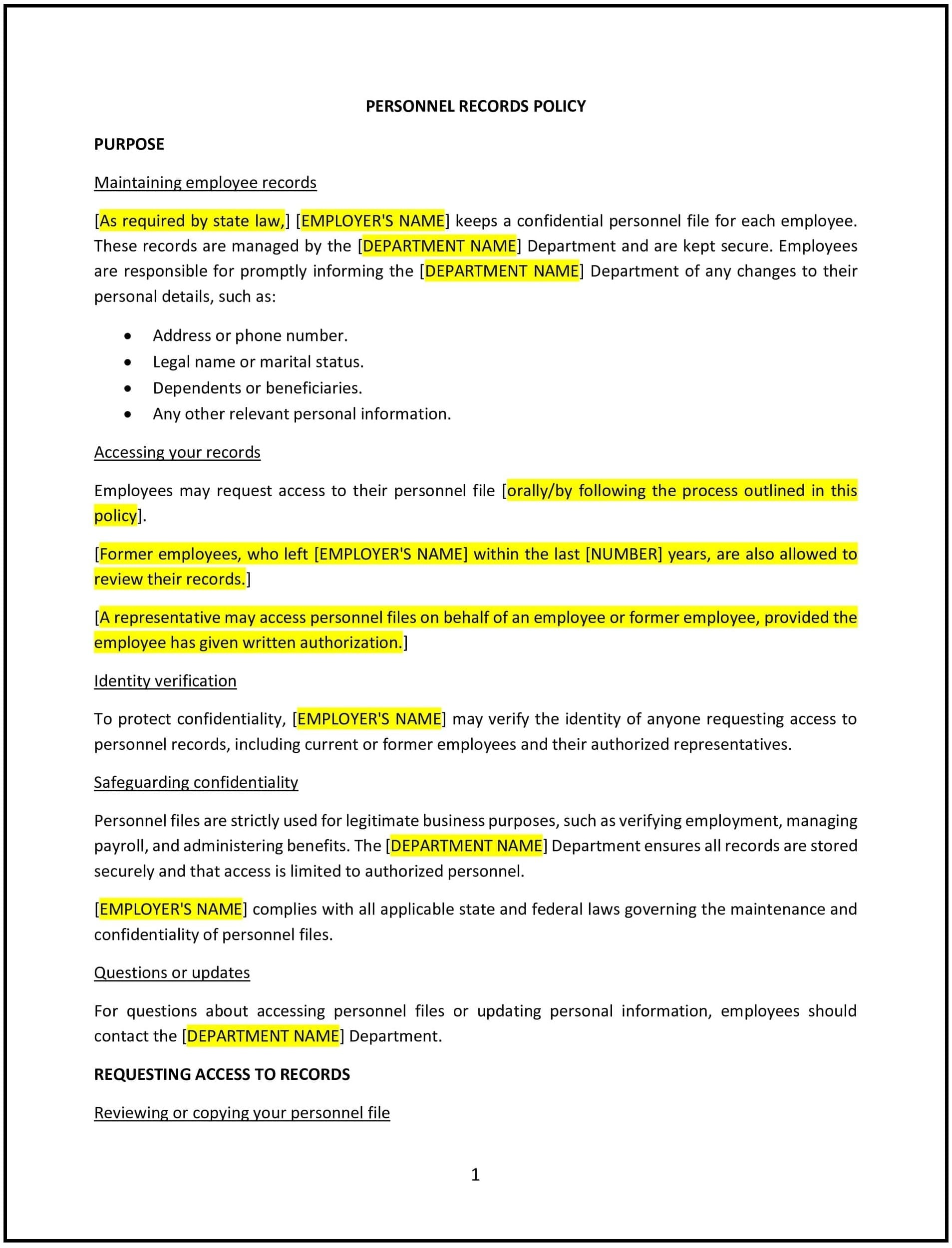Got contracts to review? While you're here for policies, let Cobrief make contract review effortless—start your free review now.

Customize this template for free
Personnel records policy (Ohio)
A personnel records policy outlines the procedures for managing, storing, and protecting employee records within Ohio businesses. This policy defines what constitutes personnel records, including personal information, employment history, performance evaluations, and disciplinary actions. It also specifies how these records should be maintained, accessed, and retained, ensuring that they are secure, accurate, and compliant with Ohio state laws and federal regulations.
By implementing this policy, Ohio businesses can ensure that employee records are handled responsibly, maintained securely, and used appropriately, reducing the risk of legal disputes and ensuring confidentiality.
How to use this personnel records policy (Ohio)
- Define what constitutes personnel records: The policy should specify what types of documents and information are included in personnel records, such as job applications, performance evaluations, salary details, disciplinary records, and health-related information.
- Establish record-keeping procedures: The policy should outline the procedures for creating, storing, and updating personnel records, including how records will be organized and how often they will be reviewed for accuracy.
- Set guidelines for record retention: The policy should specify how long personnel records will be kept and under what conditions they will be destroyed. This should align with Ohio state law, federal regulations, and business needs.
- Address access to personnel records: The policy should clarify who has access to employee records, such as HR staff, managers, or supervisors, and under what circumstances they can access these records. It should also explain how access will be documented.
- Ensure confidentiality: The policy should emphasize the confidentiality of personnel records and outline the safeguards in place to prevent unauthorized access or sharing of sensitive information.
- Outline the employee’s right to review their records: The policy should specify how employees can access and review their own personnel records, including any procedures for requesting copies of their records.
- Clarify the process for correcting records: The policy should address the process for employees to request corrections to any inaccuracies in their personnel records, including how and when corrections will be made.
- Comply with legal requirements: The policy should ensure that personnel records are managed in compliance with Ohio state laws and federal regulations, such as the Fair Labor Standards Act (FLSA), Family Medical Leave Act (FMLA), and other applicable laws.
- Review and update regularly: The policy should be reviewed periodically to ensure it aligns with current Ohio state laws, federal regulations, and business practices.
Benefits of using this personnel records policy (Ohio)
This policy provides several key benefits for Ohio businesses:
- Ensures legal compliance: The policy helps businesses comply with Ohio state laws, federal regulations, and industry standards for managing personnel records.
- Protects employee privacy: By ensuring the confidentiality and security of employee records, the policy protects sensitive personal information from unauthorized access or misuse.
- Reduces legal risks: Properly managing personnel records can help mitigate the risk of legal disputes related to employment decisions, wage claims, or privacy violations.
- Promotes transparency: Clear guidelines for accessing and reviewing personnel records promote transparency and trust between employees and management.
- Improves record-keeping efficiency: A structured and consistent approach to managing personnel records helps businesses maintain accurate, organized, and easily accessible records.
- Enhances employee confidence: Employees are more likely to trust and feel secure in their workplace when they know their personal information is handled with care and in compliance with privacy laws.
- Supports fair employment practices: By maintaining accurate records, the business can support fair decision-making in areas such as promotions, raises, and disciplinary actions, ensuring that decisions are based on objective criteria.
Tips for using this personnel records policy (Ohio)
- Communicate the policy clearly: Ensure that all employees are aware of the personnel records policy by including it in the employee handbook, discussing it during onboarding, and providing refresher training on privacy and data protection practices.
- Implement secure storage: Use secure systems and processes to store personnel records, including digital systems with encryption, access control, and backup procedures.
- Limit access to records: Only authorized personnel should have access to employee records, and all access should be logged and tracked to ensure accountability.
- Regularly audit record-keeping practices: Conduct periodic audits of personnel records to ensure that records are accurate, complete, and compliant with legal requirements.
- Protect sensitive information: Ensure that sensitive employee information, such as health records, is handled with the highest level of confidentiality and is stored separately from other records when necessary.
- Review records periodically: Regularly review and update employee records to ensure that they reflect current employment status, job performance, and any other relevant information.
- Ensure compliance with data protection laws: Stay informed of Ohio state laws and federal regulations regarding employee privacy and data protection, and update the policy as necessary to reflect any legal changes.